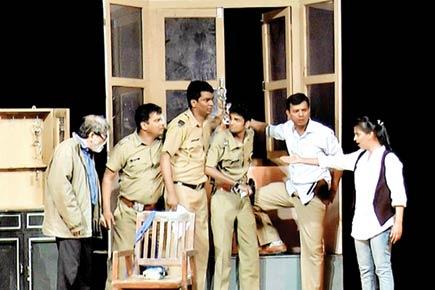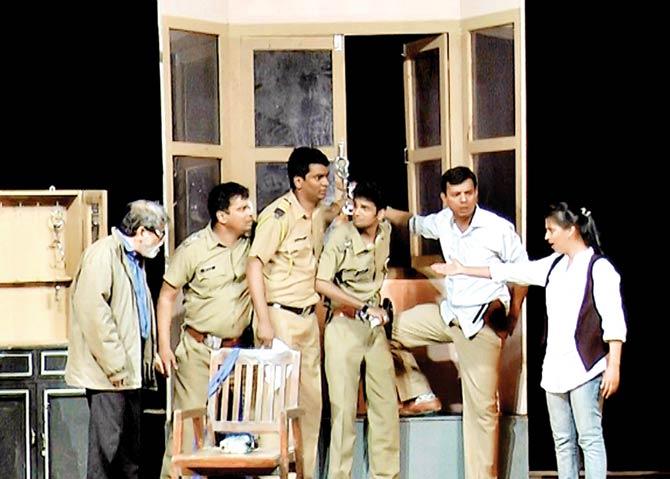Commenting on injustice in society, the play Khidki will make the audience laugh and feel uneasy at the same time with its hard truths

 Dario Fo’s Accidental Death of an Anarchist (1970) was a response to the political corruption and anarchic conditions in Italy, post World War II. Fo was inspired by the actual death of an anarchist in police custody. The cops claimed the man committed suicide by jumping off the fourth floor window, while it was obvious that he had been beaten and flung out to make murder look like suicide or an accident.
Dario Fo’s Accidental Death of an Anarchist (1970) was a response to the political corruption and anarchic conditions in Italy, post World War II. Fo was inspired by the actual death of an anarchist in police custody. The cops claimed the man committed suicide by jumping off the fourth floor window, while it was obvious that he had been beaten and flung out to make murder look like suicide or an accident.
ADVERTISEMENT
 A still from the award-winning production Khidki, which is an adaptation of the 1970 play, Accidental Death of an Anarchist
A still from the award-winning production Khidki, which is an adaptation of the 1970 play, Accidental Death of an Anarchist
Police brutality is taken so much for granted in most societies that there is so little outrage in the media. Which is why the play is one of Fo’s most popular works, which has been adapted into several languages, had multiple productions in India and many more abroad.
A new award-winning production called Khidki in Marathi, adapted and directed by Vipul Mahagaonkar, retains the dark humour of the play as well as the slapstick element, enacted by a bunch of actors with excellent coming timing and co-ordination.
A madman (Chandrashekar Gokhale in a powerful performance) is brought into the police station where the incident had taken place. He annoys the two cops on duty, claiming that he cannot be arrested because he is mad, and gets them all riled up about punctuation on his fake card which identifies him as a psychiatrist. When the inspector rushes off to a meeting, the madman snoops through files that give him information about the case. He answers the phone from another cop and learns that an investigating judge is to come to the station. So, changing his appearance a bit, he goes up to the floor from where the man had jumped and pretends to be the judge.
The three policemen on duty are a bit nervous about all the noise the prisoner’s death has generated—though they vehemently deny that they had any hand in it. But as the madman questions them, they keep contradicting themselves and eventually reveal that they had lied to the media, to their own higher-ups and to the first judge conducting an inquiry, who had concluded that the prisoner’s death was an accident. The madman convinces the cops that he wants to help them polish up the story and prove their innocence.
When asked why none of them were able to prevent the man’s fall — considering there was some distance between the chair where he was seated and the window — the constable claims he caught hold of his leg, but failed to save him because the shoe came off in his hands. To which the imposter judge points to the police report which noted both shoes on the dead man’s feet. This sequence gets increasingly farcical as the cops try to find an excuse for the shoe — the dead man must have worn one pair of shoes over the other; he must have had one foot shorter than the other, so worn two shows on one foot; he must have been wearing gumboots…their excuses and inventions get so absurd that they make complete fools of themselves.
Then, a journalist arrives to interview the inspector about the anarchist’s death. The cops want the madman to leave, but he persuades then to let him stay on and impersonate a forensic expert, so that he can help then deal with the journalist. He hobbles in pretending to have a wooden leg, a false arm and a stone eye and in one hilarious scene, has them all crawling on the floor looking for the eye that has fallen off. The journalist asks sharp questions about the dead man’s injuries that do not suggest suicide, and the fact that an ambulance was called before he fell. Then the first cop arrives with a bomb and the play moves towards an ‘explosive’ climax.
By now it is clear to the audience what really happened. Then men who did it were sure they would not get caught or punished — law enforcers often break the law with impunity. Which is why Fo does not want a conventional ‘happy’ ending in which the perpetrators are punished and justice is done; in real life this seldom happens.
As the play progresses the madman comments about the state of society — Mahagaonkar brings in current happenings in India, like farmer suicides. The play works so well here (there was a Gujarati production called Encounter, staged two years ago, a National School of Drama production, and innumerable others), because the condition of the underprivileged is no secret, nor is the position of the dissenter. The law and order system is as mess because justice takes so long.
Fo’s genius lay in the fact that he could make the audience laugh and feel uneasy at the same time. Because, in every society, in every age, when injustice is done, the majority turn their faces away so that they don’t have to take a stand. The anarchist invariably dies by accident.
Deepa Gahlot is an award-winning film and theatre critic and an arts administrator. She tweets at @deepagahlot
 Subscribe today by clicking the link and stay updated with the latest news!" Click here!
Subscribe today by clicking the link and stay updated with the latest news!" Click here!






